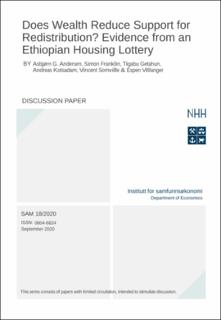Does Wealth Reduce Support for Redistribution? Evidence from an Ethiopian Housing Lottery
| dc.contributor.author | Andersen, Asbjørn G | |
| dc.contributor.author | Franklin, Simon | |
| dc.contributor.author | Tigabu, Getahun | |
| dc.contributor.author | Kotsadam, Andreas | |
| dc.contributor.author | Somville, Vincent | |
| dc.contributor.author | Villanger, Espen | |
| dc.date.accessioned | 2020-09-18T05:51:05Z | |
| dc.date.available | 2020-09-18T05:51:05Z | |
| dc.date.issued | 2020-09 | |
| dc.identifier.issn | 0804-6824 | |
| dc.identifier.uri | https://hdl.handle.net/11250/2678346 | |
| dc.description.abstract | We provide causal evidence of how an increase in wealth affects support for redistribution and beliefs about the causes of poverty. Exploiting the variation in wealth created by an Ethiopian housing lottery, we show that general attitudes toward redistribution and inequality acceptance are relatively insensitive to economic circumstances although winners are less favorable of taxing homeowners. Further, we find evidence of endogenous beliefs: relative to losers, the wealthier winners are more likely to attribute poverty to character traits and less likely to emphasize the role of luck. We interpret this as evidence of a self-serving bias. | en_US |
| dc.language.iso | eng | en_US |
| dc.relation.ispartofseries | DP SAM;18/2020 | |
| dc.title | Does Wealth Reduce Support for Redistribution? Evidence from an Ethiopian Housing Lottery | en_US |
| dc.type | Working paper | en_US |
| dc.subject.nsi | Samfunnsvitenskap | en_US |
| dc.source.pagenumber | 81 | en_US |
| dc.relation.project | 262675 | en_US |
Tilhørende fil(er)
Denne innførselen finnes i følgende samling(er)
-
Discussion papers (SAM) [657]
